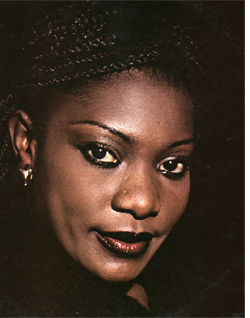|
 M'Pongo Love (Landu, M'Pongo), Congolese singer; born Boma, Congo-Kinshasa, Aug. 27, 1956; died Kinshasa, Jan. 15, 1990. M'Pongo Love (Landu, M'Pongo), Congolese singer; born Boma, Congo-Kinshasa, Aug. 27, 1956; died Kinshasa, Jan. 15, 1990.
M'Pongo took up music early in life as a member of her school choir. In spite of paralysis in her lower legs—attributed variously to a poorly administered medical injection or polio—she moved to Kinshasa at age nineteen to pursue a career as a singer. She succeeded quickly with help from O.K. Jazz saxophonist Empompo Loway, who arranged her music and enlisted a wealthy patron to finance her first endeavors.
During her debut year of 1976, M'Pongo appeared on television, performed in concert, and cut her first records backed by Empompo and various Kinshasa bands. Her songs, done in the style of the Congolese rumba, were immediate hits. "Ndaya" told the story of a happily married woman confident of keeping her husband. "Pas Possible Maty" discussed the perils of pursing romance while one is supposed to be working.
Like the great Abeti, M'Pongo ignored Kinshasa's night clubs, preferring instead to play grand concerts in large halls. She toured around Congo (then Zaire) and abroad with Empompo leading her backing band called Tcheke Tcheke Love. Her sexy voice and beautiful appearance, together with the quality of the music, attracted a multitude of fans.
At the end of the seventies, with Congo's economy in rapid decline, M'Pongo tried her luck in Paris where she signed with Safari Ambiance. Her first album, La Voix du Zaïre (1979), was a moderate success. After parting with Empompo, M'Pongo returned to a Paris studio in 1981 to record Femme Commerçante (businesswoman), her best work. The six-song album, arranged by Congo-Brazzaville's Sammy Massamba, employed the latest recording technology and the finest Congolese session players. A follow-up, Basongeur (gossipers) from 1983 was also well received.
After recording Basongeur, M'Pongo tried to break her contract with Safari Ambiance. The label filed a lawsuit that effectively barred her from recording in Paris for several years. She moved to Gabon where she recorded, less successfully, with Gabonese musician-politician Alexandre Sambat. A series of concert tours, mostly in West Africa, kept her flagging career alive in the late eighties. M'Pongo recorded a final album, Partager (sharing), in Paris in 1989 following the resolution of her case with Safari Ambiance. Death from an unspecified illness cut short her comeback attempt.
An excellent singer and first-rate song writer, M'Pongo never quite fulfilled the promise of her early career. Her work with Empompo and then Safari Ambiance had appeared to lay the foundation for long-term success, but her break with the label triggered a decline from which she never fully recovered.
© 2011 Gary Stewart
SELECT DISCOGRAPHY
M'Pongo Love/Femme Commerçante (Safari Sound LP SAS036) 1981; M'Pongo Love et Alexandre Sambat (M‚lodie LP DK006) 1985; Partager (Syllart LP SYL8386) 1989; Compilation Musique Congolo-Za‹roise (Sonodisc CD36531) 1976 recordings reissued 1993; M'Pongo Love (Kaluila CDDK016) mid-eighties recordings reissued 1995; Hommage à M'Pongo Love (best of collection vols. 1, 2 & 3, Plus de Paris, EPP11, EPP12, EPP13) 1996.
SELECT BIBLIOGRAPHY
C. Easmon, "M'Pongo Love: The Golden Voice of Zaire," Africa Music (no. 20, March/April 1984); F. Fofo-Forey, "M'Pongo Love chante Alexandre Sambat: c'est un événement," Amina (no. 171, Oct. 1, 1985); D. Hane, "M'Pongo Love: Pas de handicap dans ma tête," Afrique Magazine (no. 64, Nov. 1989); G. Stewart, Rumba on the River (London and New York, 2000).
|

